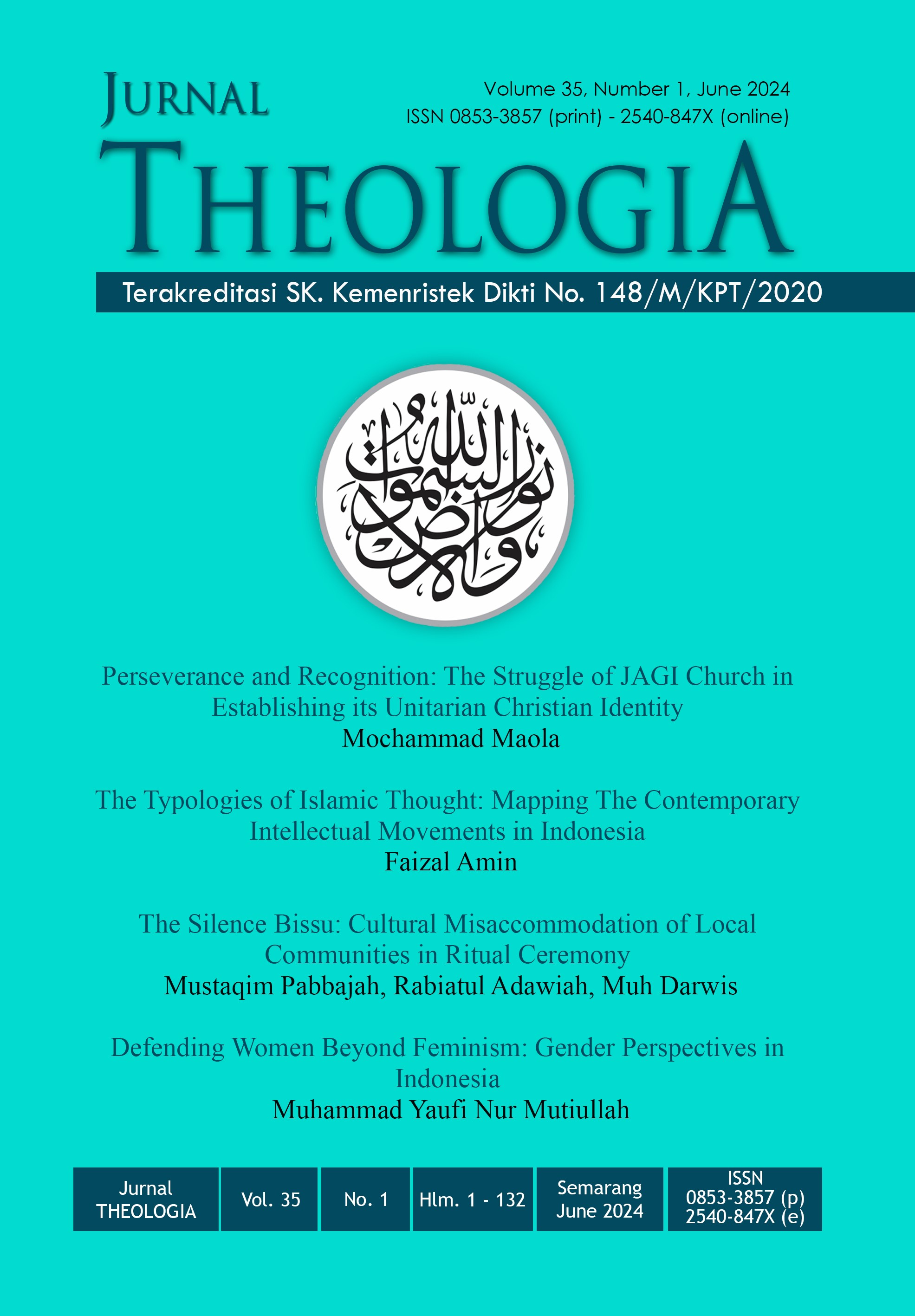Perseverance and Recognition: The Struggle of JAGI Church in Establishing its Unitarian Christian Identity
DOI:
https://doi.org/10.21580/teo.2024.35.1.18916Keywords:
JAGI Church, Unitarian, Persecution, Recognition, Religious MovementAbstract
This article aims to examine the development, challenges, and dynamics of the JAGI Church concerning religious freedom in Indonesia. This research seeks to answer fundamental questions about the identity of the JAGI Church, its mission, its influence in Indonesia's social and religious realms, and the various challenges it faces in the form of discrimination. The research methodology applied to the JAGI Church study uses a qualitative descriptive approach. This research methodology also integrates a historical contextualization approach, which aims to provide a different understanding by placing these events in Indonesia's broader historical, social, and religious context. The results of this research demonstrate a deep understanding of the dynamics of religious freedom and the challenges faced by the JAGI Church in achieving official recognition, as well as describing their efforts in fighting for interreligious dialogue and creating an environment of mutual respect and tolerance. This article also links the JAGI Church case study with the thinking of religious freedom experts, thus providing new insight into the complexities of protecting and promoting religious freedom in the context of a multicultural society like Indonesia.
Downloads
References
Abu-ʿUksa, Wael. “Heterodox Christianity, Unitarianism and the Harmonization of Monotheism: The ‘Heresy’of Khrīsṭufūrus Jibāra in Nineteenth-Century Syria.” Islam and Christian–Muslim Relations 32, no. 4 (2021): 361–82.
Amtiran, Abdon Arnolus. “Memetakan Mazhab Teologi Di Dalam Kekristenan: Sebuah Catatan Sejarah.” Asian Journal of Philosophy and Religion 1, no. 1 (2022): 59–72.
Anjaya, Carolina Etnasari. “Fenomena Persekusi Ekspresi Beragama Dalam Perspektif Pendidikan Kristen.” Jurnal Lentera Nusantara 1, no. 1 (2021): 1–12.
Arif, Syaiful. “Pandangan Pemimpin Gereja Tentang Pengaturan Organisasi Gereja Di Kota Semarang, Jawa Tengah.” In Pemimpin Gereja Moratorium Organisasi Gereja Dan HAM, edited by Nuhrison M. Nuh, 167–206. Jakarta: Puslitbang Kehidupan Keagamaan Badan Litbang dan Diklat Kementerian Agama RI, 2015.
Bagir, Zainal Abidin, and Renata Arianingtyas. “Limitations to Freedom of Religion or Belief in Indonesia: Norms and Practices.” Religion & Human Rights 15, no. 1–2 (2020): 39–56.
Bielefeldt, Heiner. “Religious Freedom as a Human Right: A Conceptual Analysis.” Human Rights Quarterly 31, no. 4 (2019): 992–1019.
———. “The Future of Religious Freedom: Challenges and Opportunities.” Journal of Law and Religion 33, no. 1 (2018): 1–26.
Bigger, Stephen. “Victor Turner, Liminality, and Cultural Performance.” Journal of Beliefs & Values 30, no. 2 (2009): 209–12.
Center, Pew Research. “Global Restrictions on Religion Rise Modestly, but Social Hostilities Involving Religion Increase Significantly,” 2020. https://www.pewresearch.org/global/2020/06/23/global-restrictions-on-religion-rise-modestly-but-social-hostilities-involving-religion-increase-significantly/.
Corneles, Herry Sonya, Jefry Yopie Afner Suak, and Veydy Yanto Mangantibe. “Analisis Kritis Terhadap Konsep Kristologi Penganut Kristen Tauhid.” TELEIOS: Jurnal Teologi Dan Pendidikan Agama Kristen 1, no. 2 (2021): 130–43.
Council, United Nations Human Rights. “Report of the Special Rapporteur on Freedom of Religion or Belief,” 2011. https://www.ohchr.org/EN/Issues/FreedomReligion/Pages/AnnualReports.aspx.
Eisner, Eric. “‘Suffer Not the Evil One’: Unitarianism and the 1826 Maryland Jew Bill.” Journal of Religious History 44, no. 3 (2020): 338–55.
Hurd, Elizabeth Shakman. “Religious Freedom as a Problem of Political Theory.” Political Theory 42, no. 1 (2014): 3–31.
———. “The Limits of Religious Freedom.” Journal of Law and Religion 30, no. 1 (2015): 107–121.
———. The Politics of Religious Freedom. University of Chicago Press, 2015.
Iskandar, Nafifa Isyafa, Faiz Abrory, Lutfi Wardani, and Ahmad Fauzan Hidayatullah. “DINAMIKA KEHIDUPAN UMAT BERAGAMA DI KOTA SEMARANG Telaah Peran Gus Dur Dan Gus Durian.” TOLERANSI: Media Ilmiah Komunikasi Umat Beragama 15, no. 1 (n.d.): 60–68.
Mohd Ramly, R, and Muhammad Khairi Mahyuddin. “Kalimah Allah: Tinjauan Ringkas Terhadap Maksud Dan Penggunaannya Dalam Kalangan Pemimpin Kristian.” Jurnal Sains Insani 04, no. 2 (2019): 2–27.
Setiawan, Hanny, and Joseph Christ Santo. “Kajian Historis Teologis Oneness Pentecostalism: Studi Kasus.” MAGNUM OPUS: Jurnal Teologi Dan Kepemimpinan Kristen 2, no. 1 (2020): 13–26.
Singgih, Emanuel Gerrit. “Amanat Kasih Sebagai Ciri Bersama Islam-Kristiani: Sebuah Tanggapan Teologis Kontekstual Protestan.” Gema Teologi 39, no. 1 (2015): 57–72.
Wajabula, Alfred Eduard. “A Critical Study of Victor Turner’s Liminality, Religion, and Nationality.” Jurnal Theologia; Vol 34, No 2 (2023)DO - 10.21580/Teo.2023.34.2.17798 , April 22, 2024. https://journal.walisongo.ac.id/index.php/teologia/article/view/17798.




















